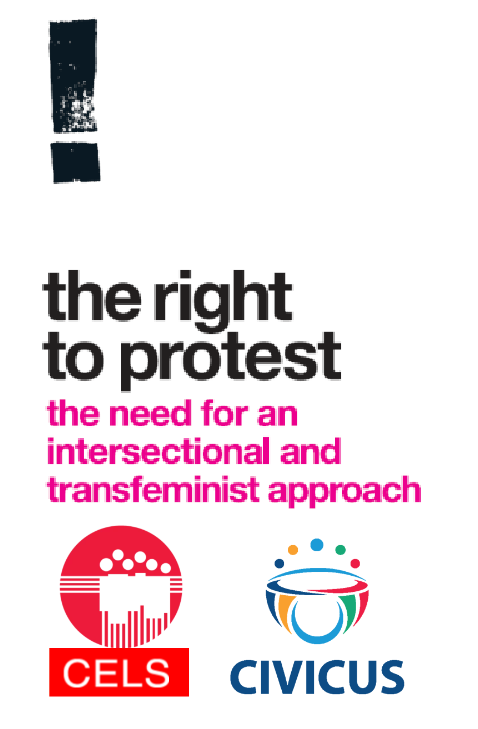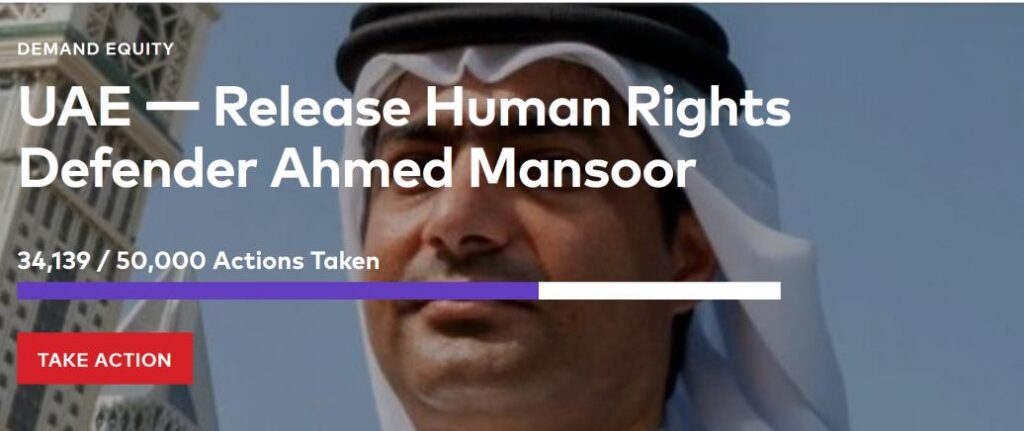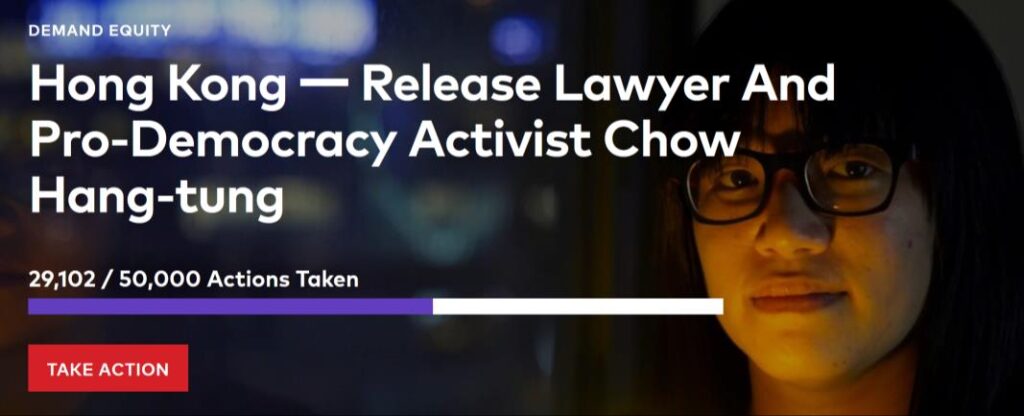Table of Contents
BUILDING COUNTERPOWER WITH MOST AFFECTED GROUPS
THE RIGHT TO PROTEST:
An intersectional and transfeminist approach
One example of our thematic research addressing most affected groups includes, ‘The right to protest: the need for an intersectional and transfeminist approach’, jointly published by CIVICUS’s Innovation for Change and the Center for Legal and Social Studies (CELS) in Argentina. Approaching FoPA from an intersectional and transfeminist perspective, the report found women and transgender people are more likely than cisgender males to experience violations of the right to FoPA. It also showed that Latin America’s Black and Indigenous women are more exposed to violence while protesting than their white counterparts.
Concerningly, the case studies included in the report documented the negative impacts across Latin America of the absence of an intersectional approach when dealing with abuses and protection of protesters.
On the basis of this research, CIVICUS is using its programme quality and innovation framework to address the depth of impact of race, gender, sexual orientation, indigeneity, class and other intersectionalities to better support most affected groups in exercising their right to FoPA. This is part of the larger work embedding outcomes and learning related to new models of organising, collaboration and resourcing from the Innovation for Change initiative across CIVICUS.

Challenging Barriers
This paper reviews civic space restrictions targeting LGBTQI+ groups in Africa. It builds on research findings from CIVICUS’s People Power under Attack 2022 report, which found that LGBTQI+ people were the group most involved in civic space incidents in Africa’s sub-Saharan region that year.

Youth Trends in Activism
For years, CIVICUS’s research has found young people to be powerful change agents. Led by the 2022-23 CIVICUS Youth Action Team (YAT), this research maps youth-led activism and youth participation in intergenerational social movements. After launching the brief ‘Youth Trends in Activism’, CIVICUS’s YAT contributed to conversations on resourcing youth-led consultations. Upon request from the Global Youth Movement, YAT designed a mentoring programme for their new Youth Accelerator initiative.

Youth Action Lab Playbook
This year, CIVICUS Youth published the Youth Action Lab Playbook for funders and intermediaries focused on how to include youth groups and other non-formal movements. It harnesses the experience and lessons learned during the Youth Action Lab pilot project 2019- 2022. To further share learnings and discuss practices to foster meaningful inclusion of youth and non-traditional CSOs, ‘learning circles’ were created with 11 members of peer organisations such as Fenomenal Funds, LGBTQI+ Youth Fund, Porticus, Restless Development, Save the Children, The Movement Trust and WINGS.
GROWING IMPACT: #StandAsMyWitness campaign
Profile-raising advocacy for the release of prisoners of conscience
CIVICUS continued its targeted advocacy for the release of arbitrarily imprisoned HRDs through the #StandAsMyWitness campaign, first launched on Nelson Mandela Day in 2020. #StandAsMyWitness builds partnerships and amplifies voices calling for the release of unjustly imprisoned civil society activists. This approach has resulted in the acquittal and/or release of 15 HRDs this past year. We have received personal letters thanking us for our work.
However, these campaigns are far from over when a HRD is released, as seen in the case of the eight Guapinol River defenders in Honduras, which we reported on last year. In January 2023, two of them, Aly Domínguez and Jairo Bonilla, were shot dead in broad daylight. In response, more than 100 human rights organisations, including CIVICUS, called for the state of Honduras to comply with its international obligations to guarantee access to justice and measures of non-repetition.
This year we also created an interactive chronology for the detained Bahraini HRD Abdulhadi Al- Khawaja, a prominent member of Bahraini civil society and a well-known human rights activist in the Gulf region. Since 1980, he and his family have faced systematic harassment and intimidation from the government of Bahrain for his human rights work. Abdulhadi is currently serving a life sentence.
Prepared in collaboration with his family, the timeline includes personal, advocacy and persecution events. FrontLineDefenders also featured it on their webpage to call for solidarity on his behalf.
The key to #StandAsMyWitness’ success is sustained collaborative action. The campaign works closely with family members, colleagues and lawyers of profiled HRDs, who keep the campaign team updated with relevant dates, events and advocacy opportunities. Every month we identify entry points at the national level and engage in solidarity with the civil society community and decision-makers calling for their release. We hold an annual convening and campaign on 18 July, Nelson Mandela Day, to bring visibility to all the HRDs profiled in the campaign.
Over the past few months HRDs from Burundi, India, Nicaragua and the Philippines have been released thanks to advocacy efforts from the campaign and civil society solidarity. We continue to support those released by linking them up with organisations that provide relocation and psychosocial support and other resources.
Ten HRDs accused of perjury in the Philippines were acquitted by a local court. Prior to the hearing and verdict, CIVICUS together with its member Karapatan and other human rights organisations issued a public statement to the media and an open letter to relevant diplomatic missions in the Philippines and ran a public campaign on Twitter to reach a wider audience. CIVICUS also featured the case in the UPR report for the Philippines’ 4th cycle submitted jointly with Karapatan. We received a letter expressing gratitude on behalf of the HRDs, sent by Cristina Palabay of Karapatan.
In Burundi, CIVICUS advocated for the release of detained HRD Germain Nkina, sentenced to five years in prison in 2021 under accusations of collaborating with armed groups. We shared details of his arrest and detention with the UN Special Rapporteur on the situation of human rights defenders, Mary Lawlor, and together with regional groups continued to advocate for his release. The Supreme Court later quashed the sentence and ordered his release.
Even before #StandAsMyWitness began, CIVICUS has worked to highlight the arbitrary imprisonment of Pakistani civil society activist Professor Muhammad Ismail and his wife. In February this year, both were acquitted in a terrorism, sedition and criminal conspiracy case by the Peshawar Anti-Terrorism Court.
We also partnered with Global Citizen, using its networks and global reach to engage citizens in multiple countries to take actions for HRDs detained and call for their release.
SUPPORTING NETWORKS TO BUILD COUNTERPOWER:
In addition to its research and #StandAsMyWitness campaign, CIVICUS supports several networks around the world.
Vuka! Coalition for Civil Society
Another CIVICUS-supported space to foster mobilisation for change is the Vuka! coalition, which includes over 250 civil society groups working together to reclaim civic space. Between July and November 2022, Vuka! released a final report and next steps, ‘Dialogue on corporate accountability and cooperation to protect and promote civic space’, held a dialogue to nurture civil society well-being, and released an analysis of civil society needs from the Vuka! Right to Protest survey, which identified needs such as water and safe spaces to create banners to exercise FoPA rights. Vuka! consultations with the UN Special Rapporteur on the situation of human rights defenders working on a thematic report on issues related to migration, refugees and asylum and the realisation of the guidelines for lawyers in support of peaceful assemblies were held for Central Asia, Europe, MENA and sub-Saharan Africa. Over 40 organisations identified common experiences, assessed threats and opportunities and explored prevention and protection measures. The Vuka! rapid response team had coordination calls for El Salvador, Ethiopia, Myanmar, Russia and Tanzania.

Global Resource Hubs
Six regional Global Resource Hub partners exchanged tools and strategies and built solutions and solidarity with others around FoPA. Extensive consultation with partners and networks revealed a gap regarding the prevention of FoPA violations against vulnerable groups.
The consultations also yielded 65 solutions to FoPA’s most pressing prevention challenges, such as encouraging the use of art and creative expression to raise awareness and developing resources for holistic safety. In addition, they found that alliances and coalitions specific for FoPA are quite weak and usually focused on specific causes such as women’s rights or climate change.
Global Resource Hub partners will provide links between the local and regional levels – a critical gap identified in a prevention approach to FoPA violations – in three thematic areas: innovative tools and tactics, building alliances and counterpower, and financial and non- financial resourcing.


Consortium for Human Rights and Media Development in Sub-Saharan Africa (CHARM)
CHARM’s seven partners work collectively to protect democratic space and build resilience among civil society and independent media. CHARM focuses its work on sub-Saharan African countries where civic space is obstructed – that is, where there are heavy restrictions but there is still some space that makes it possible to speak out, organise and act, including pockets of resistance that can be supported to strengthen human rights and democratic freedoms.
From October 2019 to June 2023, CIVICUS was the coordinating member of CHARM. We continue to be an implementing partner, but in June 2023 the coordination function was undertaken by DefendDefenders.
CHARM project support ignites climate resilience and empowerment
In Uganda, the CHARM project through its local partner Action for Youth Development (ACOYDE) has demonstrated the transformative power of community-based initiatives, turning challenges into opportunities for growth and positive change with support and sustained training conducted under the CHARM project. ACOYDE’s work is a shining example of how targeted interventions can empower people and communities to create a more sustainable and equitable world.
The devastating effects of climate change were becoming increasingly evident in Uganda, disproportionately impacting on women who, despite being the breadwinners of most rural families, had limited access to resources such as land, credit, agricultural inputs, decision -making structures, technology, training and extension services.
WHAT WE DID: We worked with civil society at national, regional and international levels.





